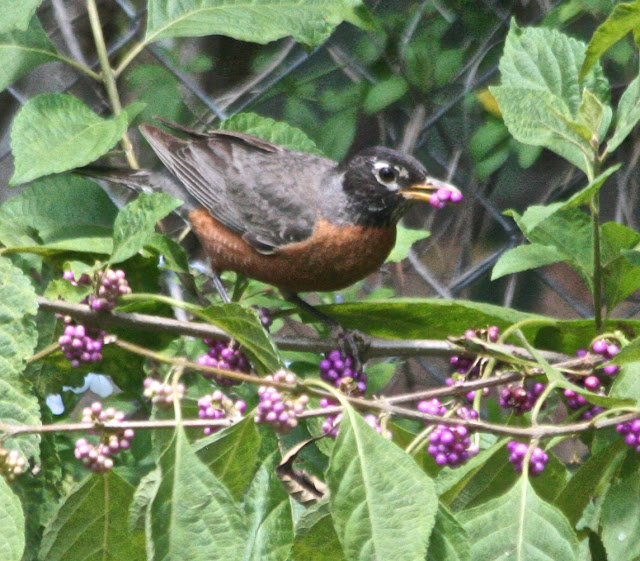This week in birds - #529
A roundup of the week's news of birds and the environment:
The beautyberries are ripe and the American Robins and other fruit-eating birds are grateful. Interestingly, I have a couple of bushes that produce white berries and those have already been stripped. Apparently, there is something about the white berries that tastes particularly good to the birds. There are plenty of the purple berries left to help feed them through the winter.*~*~*~*
Let's start this roundup with a positive story: In a report published this week, the International Energy Agency says that renewables will overtake coal to become the main source of electricity generation by 2025.
*~*~*~*
At this point, is it even possible to save Nature? That is a question being considered at the COP15 meeting in Montreal this week.
*~*~*~*
One writer believes that a good way to save Nature and the planet is to focus on saving wild cats.
*~*~*~*
The continuing eruption of the Mauna Loa volcano has given scientists a rare look into the Earth.
*~*~*~*
Here's the latest from the American Bird Conservancy, including news of the rediscovery of the Black-naped Pheasant Pigeon, a bird that had been presumed extinct.
*~*~*~*
If the Rediscovering America's Wildlife Act successfully makes its way through Congress and becomes law, it will offer some hope for the survival of Florida's perilously endangered panthers.
*~*~*~*
In other news of Florida's wildlife, an invasive iguana got into an electricity substation in Lake Worth Beach this week and in the process committed suicide and caused a large-scale power outage.
*~*~*~*
Peyote is important to the religious practices of some Native American groups and its continuing existence is being threatened by land development and over-harvesting.
*~*~*~*
A bill curbing private ownership of big cats is expected to be swiftly signed into law by President Biden.
*~*~*~*
Hurricane erosion of a Florida beach has uncovered a shipwreck dating back to the 1800s.
*~*~*~*
Greenland is no longer very green but evidence has been uncovered that shows it was quite the lush environment a couple of million years ago.
*~*~*~*
The Ankylosaurus had a sledgehammer-like tail club that was capable of delivering bone-cracking blows. Apparently, it was deployed against its own kind as well as against predators.
*~*~*~*
A volcano erupting on Java forced the evacuation of around 2,000 people this week.
*~*~*~*
The Texas Public Policy Foundation is all about protecting the high-carbon lifestyle and trying to make it even more dominant in the world. Who cares about climate change!
*~*~*~*
Is an underground greenhouse actually a thing? Well, yes, it is.
*~*~*~*
Park rangers in Mozambique are getting sneaky; they are using silent offroad ebikes to catch poachers.
*~*~*~*
This little beauty is an Allen's Hummingbird and it is the American Bird Conservancy's Bird of the Week.



Hello Dorothy. Thanks for the weekend roundup to start my day off just right. I am always happy to have depressing news encapsulated in one spot! It is hard to believe that an organization would actively promote fossil fuels, and not try to reduce their use, but this is Texas after all. I know you live there and I hate to sound mean-spirited but when I look at the politics there, the re-election of a governor like Abbott, Ted Cruz spouting off like a maniac, and women begging for abortion rights, the assault on people raising butterflies (how heinous is that?), it is hard to be positive. There's a nice house for sale one street over from here, Dorothy. Shall I put in an offer for you?
ReplyDeleteThanks for the offer and if I were the only one to consider, I might take you up on it.
DeleteThank you, Dorothy, for keeping us informed. Be blessed!
ReplyDeleteThank you for visiting and reading.
DeleteIt has always seemed strange to me that big cats could be privately owned.
ReplyDeleteYesterday I saw a good three hundred American Robins in the trees in East Texas where my son and his family lives. I don't think I've ever seen so many.
I can remember winters when we lived in northeast Texas when we had a great influx of robins. One winter in particular -1977-78 - stands out in my memory. There were robins everywhere that winter.
DeleteI love Port Townsend, and I hope their idea spreads, too.
ReplyDeleteIt seems only sensible and just to acknowledge the rights of these intelligent and sensitive beings.
Delete